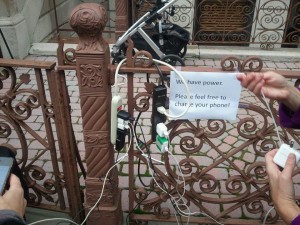Charity, proof scarcity doesn't always increase prices.
 Economic theory states that scarcity increases prices; but, exactly the opposite occurs. People share with their neighbors.
Economic theory states that scarcity increases prices; but, exactly the opposite occurs. People share with their neighbors.
Widespread power outages is the definition of scarcity. The people people without electricity clearly have a need. Why didn’t it lead to massive profit taking? In a real free market there is another choice, it’s call charity.
The person sharing their electricity didn’t have a scarcity, they had an abundance, more than they needed. The value of helping people in need outweighed any monetary profit or the hassle involved in selling access to electricity. This situation shows that given the choice people gladly share. If there isn’t a significant cost involved sharing people will share.
What is Abundance?
Do you work, purchase, or consume anything? If so this new understanding of Abundance effects you.
“You keep using that word. I do not think it means what you think it means.” The character Inigo Montoya from the movie “Princess Bride”
In 2000 I began a project to change the world. My partner in this project was The Shad0w, contributor to the BitTorrent protocol and creator of BitTornado program. Napster and other peer-to-peer file sharing systems were in full swing and BitTorrent was just starting to catch on. At that point we realized that it was impossible to stop people from copying information. Music, movies, books, or software programs are all just information. Any information can be digitized. Once digitized copies are basically free. But we also realized that if people weren’t paid to make new information the world would stagnate. The entire legal system of intellectual property was based on restricting copies and now that was impossible.
While Shadow worked on BitTorrent and other technologies I worked on business models for this new world we were entering. I began researching, doing experiments and reexamining everything I knew about information. The result of that were several profound discoveries. One of them was a completely different way of looking at economics.



 Predictive Innovation Training
Predictive Innovation Training Predictive Innovation: Core Skills Book
Predictive Innovation: Core Skills Book RoundSquareTriangle.com
RoundSquareTriangle.com